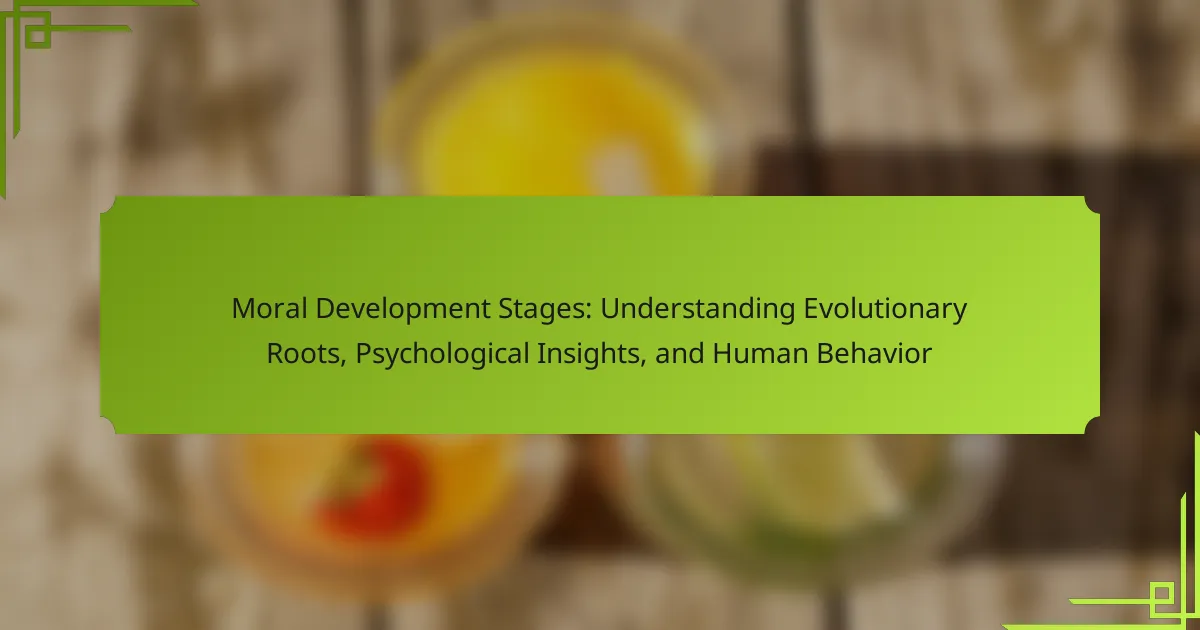Understanding moral development stages is crucial for enhancing interpersonal relationships and fostering empathy. This article explores the evolutionary roots of morality, psychological insights into moral reasoning, and the influence of human behavior on ethical frameworks. It examines the progression from pre-conventional to post-conventional stages, highlighting the impact of social interactions and cognitive development. Additionally, it addresses unique and rare attributes that shape individual moral evolution across cultures.
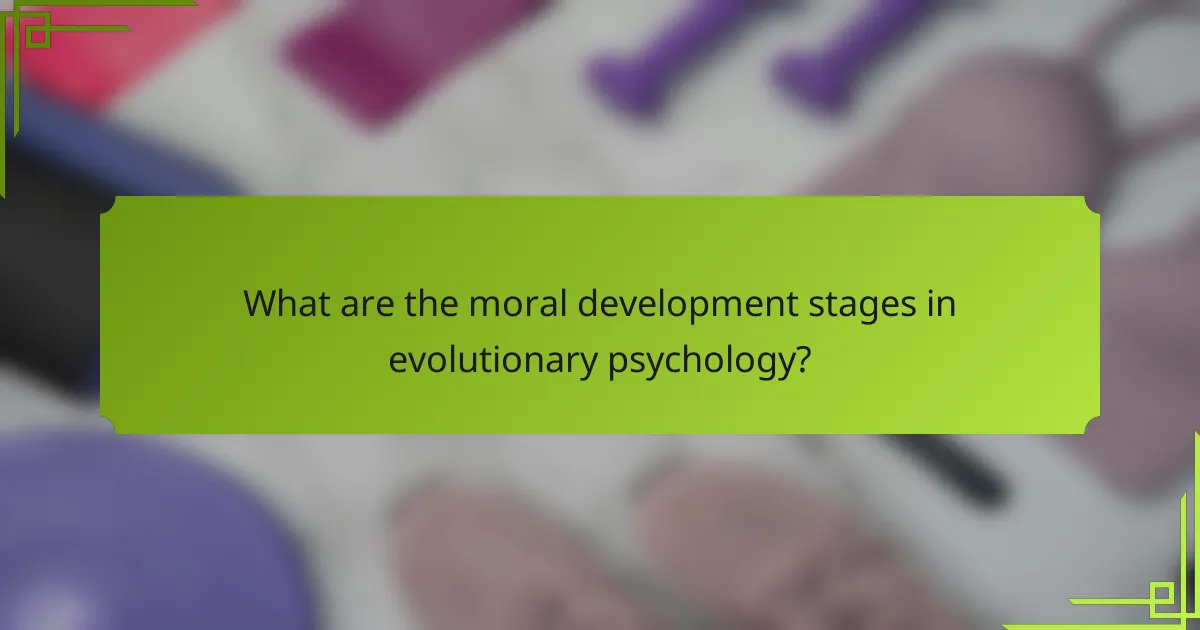
What are the moral development stages in evolutionary psychology?
Moral development stages in evolutionary psychology outline how humans evolve their understanding of right and wrong. These stages reflect the interplay between biological instincts and social learning.
The first stage is pre-conventional, where behavior is driven by self-interest and avoiding punishment. The second stage is conventional, characterized by adherence to social norms and rules. The final stage is post-conventional, where moral reasoning is based on abstract principles and values.
Research indicates that these stages are influenced by both genetic predispositions and environmental factors, shaping human behavior across cultures. Understanding these stages aids in comprehending moral reasoning development in individuals.
How do evolutionary roots influence moral reasoning?
Evolutionary roots significantly shape moral reasoning by influencing innate behaviors and social norms. Human morality evolved to enhance group cohesion and cooperation, promoting survival. For example, empathy and fairness, rooted in evolutionary psychology, drive moral judgments. These traits foster trust and collaboration, essential for community living. Understanding these connections illuminates how deeply embedded evolutionary factors guide contemporary moral frameworks.
What psychological insights reveal the progression of moral development?
Psychological insights reveal that moral development progresses through distinct stages influenced by cognitive and social factors. Theories by Kohlberg and Gilligan illustrate this evolution, highlighting how individuals navigate complex moral dilemmas. Kohlberg identifies six stages grouped into three levels: pre-conventional, conventional, and post-conventional. Each stage reflects a deeper understanding of justice and ethical reasoning. Gilligan emphasizes the role of care and relationships, suggesting that moral development can differ based on gender perspectives. These insights underscore the interplay between individual cognition and social context in shaping moral behavior.
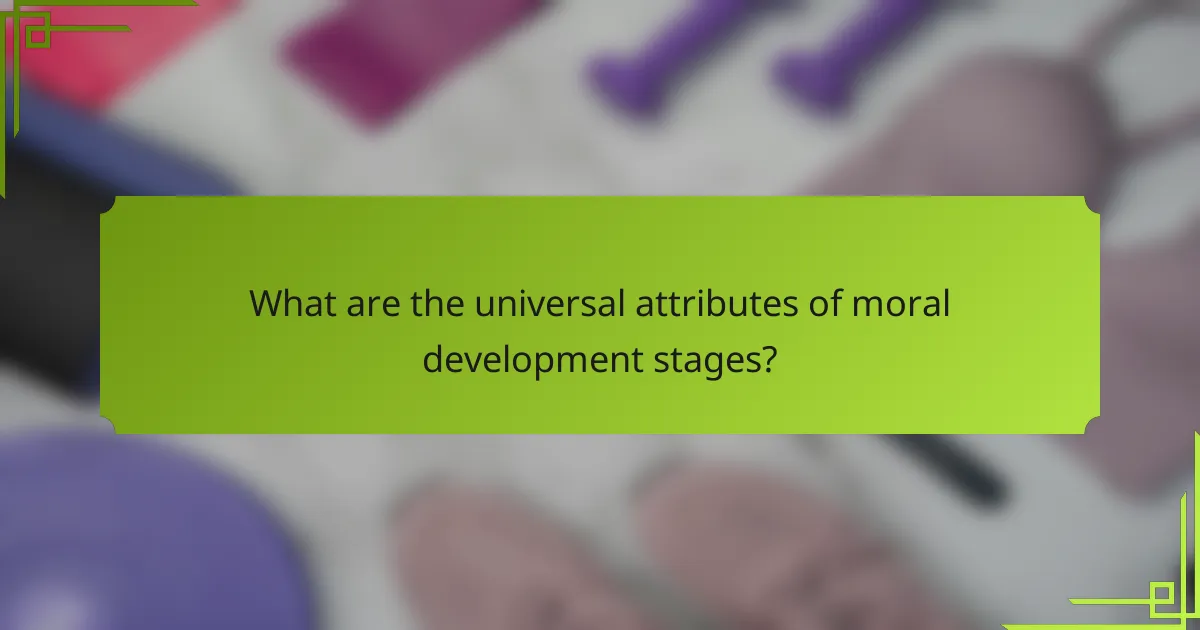
What are the universal attributes of moral development stages?
Moral development stages share universal attributes such as progression, influence of social interactions, and cognitive development. These stages reflect how individuals evolve in their understanding of right and wrong, often influenced by cultural context and personal experiences. Progression typically follows a sequence, moving from simplistic to complex moral reasoning. Social interactions, including peer relationships and family dynamics, play a crucial role in shaping moral beliefs. Cognitive development allows for deeper understanding and application of moral principles, highlighting the interplay between thought processes and ethical behavior.
How do empathy and social cohesion contribute to moral evolution?
Empathy and social cohesion significantly enhance moral evolution by fostering understanding and cooperation among individuals. Empathy allows people to connect emotionally, leading to altruistic behavior. Social cohesion strengthens community bonds, promoting shared values and collective moral standards. Together, they create an environment conducive to moral growth and ethical decision-making.
What role does cultural context play in moral development?
Cultural context significantly influences moral development by shaping values, beliefs, and social norms. Different cultures prioritize various moral principles, affecting how individuals perceive right and wrong. For example, collectivist cultures often emphasize community and familial obligations, while individualistic cultures may prioritize personal freedom and autonomy. This variation leads to unique moral reasoning and ethical frameworks across societies. Studies show that exposure to diverse cultural perspectives can enhance moral reasoning skills, promoting empathy and understanding. Thus, cultural context serves as a critical factor in the evolution of moral development.
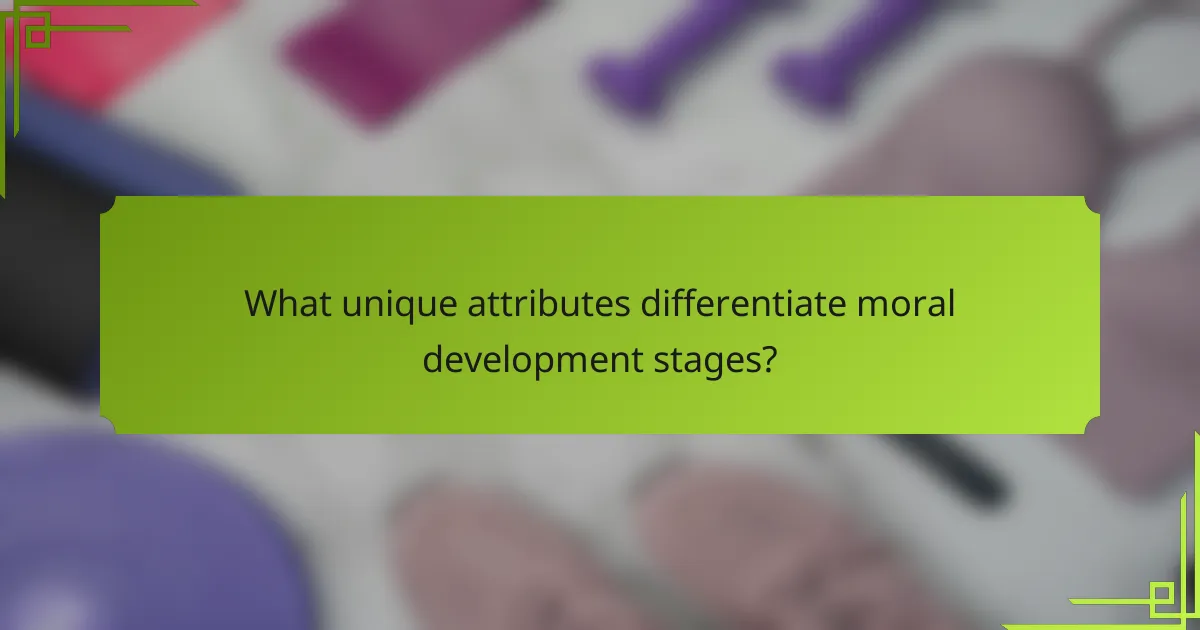
What unique attributes differentiate moral development stages?
Moral development stages are differentiated by unique attributes such as the focus on justice versus care, the progression from self-centered to societal perspectives, and varying levels of moral reasoning complexity. These attributes highlight how individuals evolve in their understanding of morality through distinct phases influenced by cognitive and emotional growth.
How do childhood experiences shape moral frameworks?
Childhood experiences significantly shape moral frameworks by influencing values, empathy, and decision-making. Early interactions with caregivers and peers establish foundational beliefs about right and wrong. Research indicates that children who experience supportive environments develop stronger moral reasoning skills. Conversely, negative experiences can lead to distorted moral perceptions. The unique attribute of these formative experiences lies in their lasting impact on adult behavior and ethical choices. As a result, understanding these influences is crucial for fostering moral development in future generations.
What impact do societal norms have on moral decision-making?
Societal norms significantly influence moral decision-making by shaping perceptions of right and wrong. These norms establish the framework within which individuals evaluate ethical dilemmas and behaviors. For example, in collectivist cultures, community welfare often takes precedence over individual desires, impacting moral choices. Conversely, in more individualistic societies, personal autonomy may drive moral reasoning. The evolution of these norms can lead to unique moral frameworks that vary across different societies, highlighting the dynamic interplay between culture and ethics.
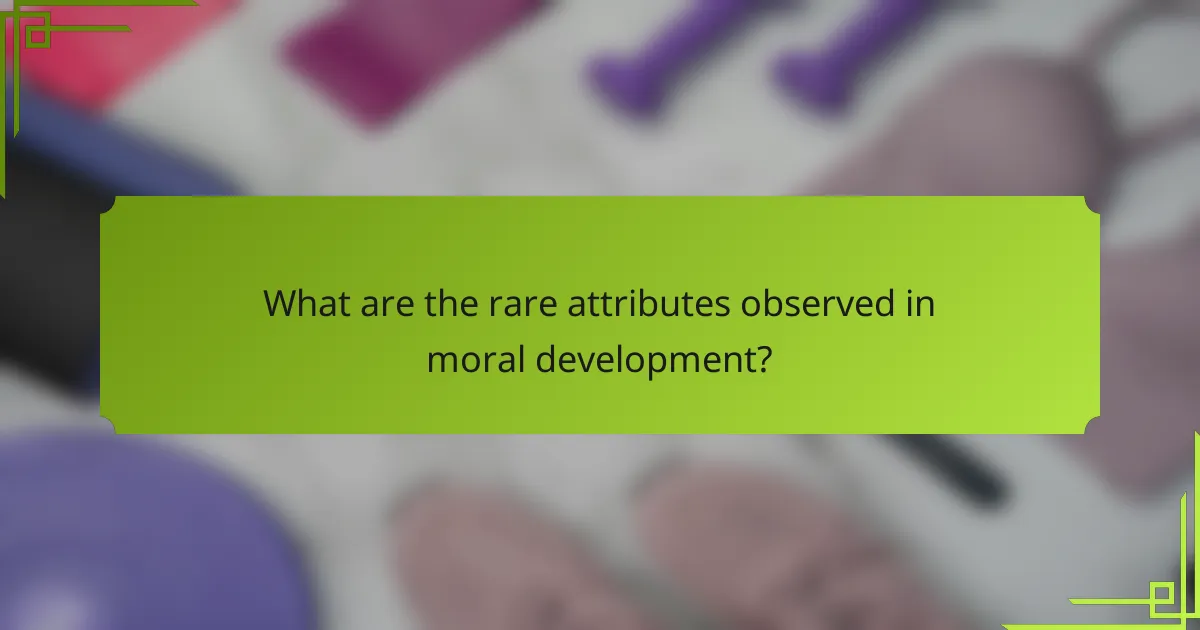
What are the rare attributes observed in moral development?
Rare attributes in moral development include the influence of cultural narratives, the role of empathy in moral reasoning, and the impact of early childhood experiences on ethical frameworks. These attributes are not universally observed and highlight unique pathways individuals may take in their moral evolution. For instance, cultural narratives can shape moral perspectives in ways that diverge significantly from more commonly recognized stages. Empathy, while often acknowledged, varies greatly in its development and expression, influencing moral decisions uniquely for each individual.
How do extreme circumstances affect moral choices?
Extreme circumstances can significantly alter moral choices by intensifying emotional responses and prioritizing survival instincts. Under stress, individuals may deviate from their moral principles, leading to decisions that align more with immediate needs than ethical standards. Research indicates that extreme situations can trigger a unique attribute of moral reasoning, where utilitarian perspectives often overshadow deontological ethics. As a result, individuals may justify harmful actions if deemed necessary for survival or the greater good. Understanding this dynamic is crucial for exploring moral development stages and their implications on human behavior.
What is the significance of moral dilemmas in understanding human behavior?
Moral dilemmas are crucial for understanding human behavior as they reveal the complexities of ethical decision-making. They highlight the conflict between personal values and societal norms, showcasing how individuals navigate these tensions. Analyzing moral dilemmas provides insights into moral development stages, illustrating how reasoning evolves from simplistic to more nuanced perspectives. This evolution reflects psychological growth and the influence of cultural contexts on behavior. Ultimately, moral dilemmas serve as a lens through which we can examine the underlying motivations and principles that guide human actions.
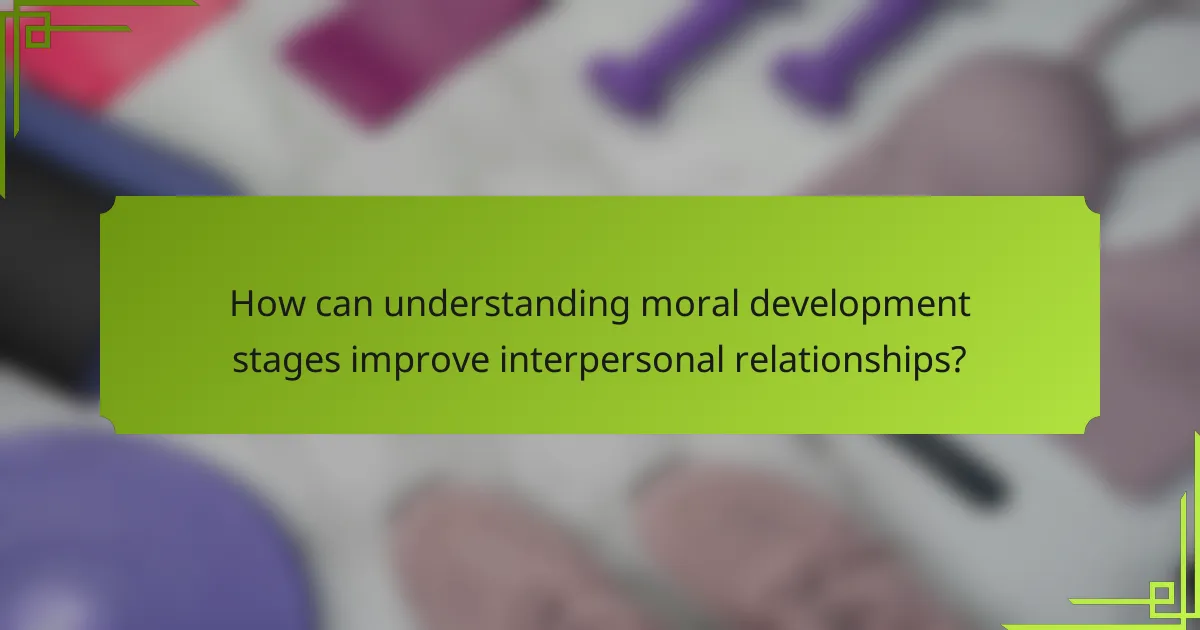
How can understanding moral development stages improve interpersonal relationships?
Understanding moral development stages enhances interpersonal relationships by fostering empathy and effective communication. Recognizing these stages allows individuals to appreciate differing perspectives, leading to more meaningful connections. For instance, individuals at higher moral stages often prioritize fairness and justice, which can resolve conflicts and promote collaboration. Additionally, understanding these stages aids in personal growth, as individuals reflect on their moral reasoning and its impact on relationships. This awareness cultivates patience and compassion, essential for nurturing strong interpersonal bonds.
What best practices can enhance moral reasoning in everyday life?
Enhancing moral reasoning in everyday life involves deliberate practices. Engaging in reflective thinking, considering diverse perspectives, and discussing ethical dilemmas can significantly improve moral decision-making.
Practicing empathy allows individuals to understand the feelings of others, fostering a deeper moral insight. Additionally, cultivating open-mindedness encourages the exploration of various ethical viewpoints, which is crucial for moral development.
Regularly evaluating personal values and actions against moral standards helps reinforce ethical behavior. Participating in community service or social discussions also provides practical experiences that enhance moral reasoning.
Incorporating these practices consistently can lead to a more nuanced understanding of morality and improved decision-making in complex situations.
What common mistakes should be avoided in moral development discussions?
To enhance moral development discussions, avoid oversimplifying complex theories and neglecting diverse perspectives. Failing to recognize the interplay between psychological insights and cultural influences can lead to misunderstandings. Additionally, dismissing empirical evidence may weaken arguments. Engaging with various moral frameworks enriches the conversation and fosters deeper understanding.
How can insights from evolutionary psychology inform ethical decision-making?
Insights from evolutionary psychology can enhance ethical decision-making by revealing innate moral intuitions. Understanding moral development stages highlights how evolutionary roots shape human behavior and ethical frameworks. For instance, empathy evolved as a survival mechanism, influencing decisions that consider others’ welfare. This perspective fosters a deeper comprehension of moral dilemmas, aligning ethical choices with human nature. By integrating these insights, individuals can navigate complex ethical landscapes more effectively, promoting decisions that resonate with both personal values and societal norms.
